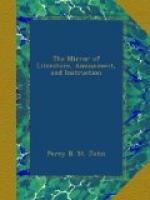* * * * *
FIGHT IN A CHURCH.
Among the ecclesiastical anecdotes of the age of the Commonwealth, is a tradition still current at Bishop’s Middleham, concerning their intrusive vicar, John Brabant. He was a soldier in Cromwell’s army; but preferring the drum ecclesiastic to the drum military, he came with a file of troops to Middleham, to eject the old vicar. The parishioners made a good fight on the occasion, and succeeded in winning the pulpit, which was the key of the position, for their proper minister; but Brabant made a soldierly retreat into the chancel, mounted the altar, and there preached, standing, with a brace of horse-pistols at his side. Right, however, had little chance when Might ruled; and the old vicar, who had held the living forty years, was ejected.
* * * * *
SPANISH AND ITALIAN REFUGEES.
A pretty little “Garland of Miscellaneous Poems” has just been published by one of our occasional correspondents,[1] for the Benefit of the Spanish and Italian Refugees. These poems are gracefully written, independent of the interest they ought to awaken from the profits of the sale being appropriated to a benevolent purpose. We subjoin an extract—
[1] Mr. W.H. Brandreth, author of “Field Flowers,” &c.
THE FIELD OF BANNOCKBURN.
A fearful form from Stirling’s tower
Was dimly seen to bend;
He look’d as though, ’mid
fate’s far hour,
Some mighty woe he kenn’d.
White was his hair, and thin with age,
One hand was raised on high,
The other ope’d the mystic page
Of human destiny.
And oft, ere shone the moon’s pale
ray,
His eyes were seen to turn
Where, in the gloomy distance, lay
The plain of Bannockburn.
And fair uprose the queen of night,
Shining o’er mount and
main;
Ben Lomond own’d her silvery light,
Forth sparkled bright again.
Fair, too, o’er loyal Scoone she
shone,
For there the Bruce had kneel’d,
And, half forgetful, look’d she
down
On Falkirk’s fatal field.
For ere to-morrow’s sun shall set,
Stern Edward’s self
shall learn
A lesson pride may ne’er forget,
Where murmurs Bannockburn.
A voice is heard from Stirling’s
tower,
’Tis of that aged seer,
The lover leaves his lady’s bower,
Yet chides her timid tear.
The infant wakes ’mid wild alarms,
Prayers are in vain outpour’d;
The bridegroom quits his bride’s
fond charms,
And half unsheaths his sword.
Yet who may fate’s dark power withstand,
Or who its mandate spurn?
And still the seer uplifts his hand
And points to Bannockburn.




